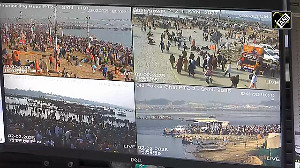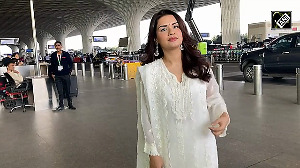Voicing serious concern over the ongoing spate of violent protests in Jammu and Kashmir, Prime Minister Manmohan Singh on Thursday highlighted the need to "revisit" standard operating procedures and crowd control measures by security forces to deal with public agitations.
"Despite the curtailment of militant activities in Jammu and Kashmir, the public order dimension in the state has become a cause of serious concern," he said while addressing the three-day conference of directors general and inspectors general of police in New Delhi.
"We need to revisit standard operating procedures and crowd control measures to deal with public agitations with non-lethal, yet effective and focused measures. We also cannot have an approach of one size fits all," the prime minister stressed.
His comments come against the backdrop security forces in Jammu and Kashmir facing flak for the killing of over 60 civilians in police action to quell violent protesters since June this year.
Singh asked Home Minister P Chidambarm to establish a high-powered task force to come out with a set of recommendations on non-lethal crowd control measures in the next two to three months.
He said that instead of a single standard sequence for the use of force, other countries have put in place procedures that vary according to the situation.
The prime minister cited the Rapid Action Force's experience for non-lethal crowd control which has been successful, saying it should be examined for being followed by other police forces also.
The prime minister said policing in the country has become increasingly complex over the years. Social tensions, religious disputes, growing economic disparities and regional, linguistic and ethnic differences have long been major challenges to effective policing in the country, he said.
"But of late the growing presence of non-state actors, fundamentalist groups and left wing extremists has further complicated matters," he said.
Singh said the growing inter-linkages of destabilising and criminal forces, across states and across our borders, call for far greater vigilance and coordination between thesecurity agencies than ever before.
The prime minister said after a relative lull in 2009, the challenges to country's internal security seem to have re-emerged in more virulent forms. "While we have made good progress in terms of recruitment and setting up of better institutional arrangements for intelligence, investigation, coastal security and counter-terrorism, the problems we face remain daunting," he said.
Singh said there was need to do much more to meet the challenge of Naxalism. "We recognise that the Naxalites are our own people and are ready to talk to them provided they abjure the path of violence. We also stand committed to making special efforts to develop the areas affected by naxal violence, many of which are inhibited predominantly by our tribal brothers and sisters," he said.
Referring to the Northeast, the Prime Minister said the situation in the region was better now than what it was in the recent past, though some areas of concern still remain. "In Manipur, for example the Naga-Metei divide has accentuated. The unfortunate growth of identity based assertiveness in the Northeast, particularly in Manipur and the North Cachar Hills (Assam) needs well thought-out and sensitive handling. The situation in Darjeeling hill area also needs a careful watch," he said.
Singh said the writ of the state should be firmly established in all these areas and the state police and the central paramilitary forces should take firm action against those who take the law into their own hands.
The prime minister said within the police forces, the current system of promotion is based essentially on seniority and it needs to be suitably recalibrated to catalyse better performance and motivation. "For example, a successful stint in an extremism-affected district, should result in greater career benefits to the officers," he said.
Favouring build up of capacities for gathering intelligence in various Indian languages, Singh said the intelligence agencies of the centre and states could draw upon police persons and also incentivise officers to acquire and use relevant local language skills.
The prime minister said over the past decade, the central government has sought to assist states in addressing their manpower requirements through financial support for India Reserve battalions, Special Police Officers, and the setting up of village defence committees. "But, it appears that recruitment to the regular state police forces has not yet picked up as effectively as it should. Although effort has been made in the last two years to address this issue, the backlog remains pretty large. "The quality of recruitment also remains an area of concern. The Ministry of Home Affairs has already circulated a template for a transparent and objective recruitment process but most states are yet to adopt this," he said.
The prime minister said over the past decade, the government has institutionalised deliberations and structured interactions at various levels and this conference has been a time-tested mechanism for enhanced coordination. "But given the changing circumstances I believe the time has perhaps come for it to reinvent itself. Perhaps this year onwards you could set for yourself some quantifiable goals to be achieved in the coming year. The actual achievement against these goals could be reviewed in the subsequent conference," he said.
During the two-day conference, the top police brass of the country is deliberating internal security issues like cross border terrorism, Maoist violence, situation in Jammu and Kashmir and the Northeast and better coordination among state police forces.






 © 2025
© 2025